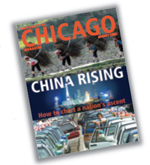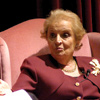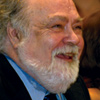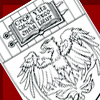|
||
      |
Letters:
If I ever want
to read florid prose and clichés gone wild…
 AN “INCONVENIENT” INVASION
AN “INCONVENIENT” INVASION
“China on the Rise” (August/06) is well-written and well-balanced, as is to be expected from the University of Chicago Magazine. There is a curious hiatus, however: on page 29, the “inconvenient history” omits the first international act of the People’s Republic of China, the invasion of Tibet and the subsequent genocide of the Tibetan people.
Paul E. Oppenheimer
Scottsdale, Arizona
STRIKEOUT
Regarding “La Dolce Baseball” (August/06): When I want to read good baseball writing, I’ll get my copy of Moneyball back from my daughter. If I ever want to read florid prose and clichés gone wild, I’ll borrow a Harlequin romance from the public library.
Gina R. RoeggerHOME RUN
 I simply had to let you know that “La
Dolce Baseball” was
such a pleasant change of pace from your usual articles. It addressed the
human factor that is often missing in an effort to emphasize a higher caliber
of learning. Yet let’s face it, you must appeal to the backbone of
your educational community, and they are merely young adults in pursuit
of life’s offerings. Once removed from the intellectual stimuli that
floods their entire experience at U of C, life continues on a rather normal
path for most, as they search for their true calling, whatever that may
be. I’ll bet there are many stories like this one, and I would love
to read more of them. You’ve opened up another door, one that reminds
us all that Chicago encourages the development of more than just the intellect—it
develops the whole person: character, integrity, strength, compassion,
determination, and ethics. As I’ve said so many times to my son, “Success
in life is never measured by financial gains, but by the mere satisfaction
in knowing that somehow you have made a difference.” Your light-hearted,
candid approach to this story most assuredly appealed to many.
I simply had to let you know that “La
Dolce Baseball” was
such a pleasant change of pace from your usual articles. It addressed the
human factor that is often missing in an effort to emphasize a higher caliber
of learning. Yet let’s face it, you must appeal to the backbone of
your educational community, and they are merely young adults in pursuit
of life’s offerings. Once removed from the intellectual stimuli that
floods their entire experience at U of C, life continues on a rather normal
path for most, as they search for their true calling, whatever that may
be. I’ll bet there are many stories like this one, and I would love
to read more of them. You’ve opened up another door, one that reminds
us all that Chicago encourages the development of more than just the intellect—it
develops the whole person: character, integrity, strength, compassion,
determination, and ethics. As I’ve said so many times to my son, “Success
in life is never measured by financial gains, but by the mere satisfaction
in knowing that somehow you have made a difference.” Your light-hearted,
candid approach to this story most assuredly appealed to many.
Donna Leonhardt
Wheaton, Illinois
LOCKER-ROOM LANGUAGE
I keenly enjoyed most of the Italian baseball article. Nevertheless I’m compelled to write with a complaint. It was right of you to warn us that “This story contains language that some might find offensive.” But would it not have been even better to have simply edited out the obscenities, or else converted them to something softer or less direct? With a little imagination this is surely not too difficult. If it is objected that the realism of the piece would have been compromised, I cannot agree—the real can be conveyed indirectly or through euphemism as effectively as through brutal directness. For instance, everyone knows how male athletes talk in locker rooms. One does not have to reproduce that talk precisely in order to indicate its character. Obscene, as you know, literally means “offstage.” To keep the obscene offstage, or veiled, is not to destroy it but, in my view, to provide for a more civilized and pleasing way of experiencing it.
David Levy, AB’92
Rome
GOD, LINCOLN, AND BARTLETT’S
 Madeleine Albright chastises President Bush (“Chicago
Journal,” August/06)
for “the certainty with which he talks about his relationship with
God” and because, in her words, he “fully believes God is on
our side.” Then she compares him negatively to Abraham Lincoln, whom
she quotes as saying, “We need to be on God’s side.”
Madeleine Albright chastises President Bush (“Chicago
Journal,” August/06)
for “the certainty with which he talks about his relationship with
God” and because, in her words, he “fully believes God is on
our side.” Then she compares him negatively to Abraham Lincoln, whom
she quotes as saying, “We need to be on God’s side.”
However, President Bush never said this; it was implied by a New York Times reporter in a question to John Kerry during a presidential primary debate. John Edwards added the Lincoln quote.
The reporter prefaced her question with a paraphrase of the president’s statement that “Freedom and fear, justice and cruelty, have always been at war, and we know that God is not neutral between them.” She then put words in the president’s mouth asking, “He’s made quite clear in his speeches that he feels God is on America’s side. … Is God on America’s side?”
The mainstream media and left-wing blogosphere went wild using this line over and over, without ever checking its accuracy. It is sad that Madeleine Albright would just parrot political talking points without research.
President Bush was not making a claim that God is on America’s side regardless of America’s behavior, but that God is on the side of freedom and justice, which he, along with almost every U.S. president before him, believes are the essence of America. And as Lincoln said in the real quote when he overheard someone remark that they hoped “the Lord was on the Union’s side”:
“I am not at all concerned about that, for I know that the Lord is always on the side of the right. But it is my constant anxiety and prayer that I and this nation should be on the Lord’s side.”
Perhaps Ms. Albright could use a little less certainty in her secular-fundamentalist position and seek the spiritual certainty of Presidents Lincoln and Bush.
Samuel Silver, MBA’71
Atlanta
SIXTY-MINUTE REPRISE?
 I was surprised to see Court Theatre’s history shortened by something
like two decades (“Chicago
Journal,” August/06). Beginning
in 1955, the outdoor Court Theatre, set in and named for Hutchinson Court
and featuring students and community members, was one of the best places
on campus (mosquito-swatting aside) to spend a summer evening. I remember
fondly a performance of The Knight of the Burning Pestle, which
Court Theatre’s own Web site dates to 1962.
I was surprised to see Court Theatre’s history shortened by something
like two decades (“Chicago
Journal,” August/06). Beginning
in 1955, the outdoor Court Theatre, set in and named for Hutchinson Court
and featuring students and community members, was one of the best places
on campus (mosquito-swatting aside) to spend a summer evening. I remember
fondly a performance of The Knight of the Burning Pestle, which
Court Theatre’s own Web site dates to 1962.
Not to detract from Mr. Rudall’s accomplishment, but what bothers me most is that during the “sweet, often hilarious tributes to the man who helped grow Court Theatre,” apparently nobody bothered to mention there was such a thing before Nicholas Rudall (therefore not “the founding director of Court Theatre”) arrived on the scene, and if it was mentioned it wasn’t acknowledged in the article. Kenneth Northcott is quoted as paying tribute, but as I remember Mr. Northcott was himself a guiding light in Court Theatre’s earliest days. It would be a pleasure to see a follow-up focusing on the Court Theatre of the 1950s and ’60s and giving credit to those both on and off the stage.
John T. Dulaney, SM’62
Memphis, Tennessee
Mr. Dulaney is correct that Court Theatre began in 1955, when, as the Court Web site puts it, “a small group of artists and neighbors came together to produce three Molière plays under the stars in the Hutchinson Courtyard at the University of Chicago.” Nicholas Rudall arrived on campus in 1966 and was indeed the founding director of the theater in its rebirth as a professional, not-for-profit theater. As a tribute to Rudall, the event focused on that aspect of Court’s history, and the article followed suit.—Ed.
DIET FOR GLOBAL WARMING
In their analysis of the effects of diet on greenhouse-gas emissions, (“Investigations,” August/06) Gidon Eshel and Pamela Martin calculated that, based on a 3,774-calorie daily diet, red-meat eaters rack up yearly emissions that compare to a Chevy Suburban, while vegans are responsible for emissions comparable to a Toyota Camry. A closer look at the numbers suggests that eating less is even more important.
According to the Institute of Medicine, active young men need only about 3,067 calories, and young women about 2,403 calories. For each year above 19, subtract 10 kilocalories for men and 7 kcals for women. This means that active 45-year-old men and women on average need only 2,807 and 2,221 kcals, respectively. It is easy to see that the best way to reduce greenhouse emissions is to reduce caloric intake. Moreover, emissions due to the total calories consumed are more important than the source of those calories. Indeed, one could argue that the worldwide obesity epidemic is contributing significantly to global warming.
Exercise is the answer: it improves metabolism, suppresses appetite, improves the serum cholesterol profile, lowers blood pressure, and decreases stress and depression.
Peter G. Kaufmann, PhD’71
Annandale, Virgina
WHY THE U.S. SHOULD SUPPORT ISRAEL
 Walt and Mearsheimer (“The ‘Israel
Lobby’ Debate,” June/06)
mischaracterize the fundamental dynamics of the Arab-Israeli conflict that
motivate America’s support for Israel. The conflict between Israel
and the Arab world came out of a desire to eliminate Jews from the Middle
East. In the 1930s, inspired by the Nazis, the Mufti of Jerusalem urged
his followers to kill all of the Jews in Palestine. The United Nations
partition creating Israel occurred partly as an attempt to end two decades
of fighting. Jordan’s illegal occupation of the West Bank in 1948
was unopposed. Instead, the Arab world committed to the destruction of
the world’s only Jewish state that resided on a tiny sliver of land.
All Jews living in the West Bank and East Jerusalem were forced out, and
Jordan banned Jewish ownership of land. Jews were not even allowed to visit
holy sites in East Jerusalem after 1948.
Walt and Mearsheimer (“The ‘Israel
Lobby’ Debate,” June/06)
mischaracterize the fundamental dynamics of the Arab-Israeli conflict that
motivate America’s support for Israel. The conflict between Israel
and the Arab world came out of a desire to eliminate Jews from the Middle
East. In the 1930s, inspired by the Nazis, the Mufti of Jerusalem urged
his followers to kill all of the Jews in Palestine. The United Nations
partition creating Israel occurred partly as an attempt to end two decades
of fighting. Jordan’s illegal occupation of the West Bank in 1948
was unopposed. Instead, the Arab world committed to the destruction of
the world’s only Jewish state that resided on a tiny sliver of land.
All Jews living in the West Bank and East Jerusalem were forced out, and
Jordan banned Jewish ownership of land. Jews were not even allowed to visit
holy sites in East Jerusalem after 1948.
The Occupied Territories were seized by Israel in 1967 during a defensive war that started after Egyptian leader Nasser promised to push the Jews out to the sea. Nasser had massed most of his huge army on Israel’s border, forcing Israel to mobilize most able-bodied citizens. Israel later returned the Sinai, an oil-rich peninsula about three times the size of Israel and the Occupied Territories combined. PLO leader Yasser Arafat’s attempt to topple the Jordanian government in 1970 resulted in a short but vicious civil war. Evicted from Jordan, Arafat’s Soviet-backed forces moved into Lebanon. The presence of the PLO in Lebanon helped trigger the devastating Lebanese civil war in 1975. The resulting chaos allowed Lebanon to fall under the domination of a ruthless Syrian military. Syrian forces would not leave Lebanon until 2005, but Syrian meddling continues to this day.
Despite all of its adversity, Israel has evolved into the Middle East’s most successful and modern economy. Numerous advances in medicine, computers, communications, and many other fields come out of Israel. For example, most new Intel CPUs will be based on an Israeli design. It is truly a shame that the Arabs have devoted so much effort to eliminating Israel rather than to building up their own societies. Like the United States, Israel was built largely by immigrants—many of them fleeing persecution in Muslim countries. The United States should continue to proudly back Israel in its fight against those who seek its destruction.
Michael J. Szanto, SM’01
Chicago
ABANDON OBJECTIVITY, ALL YE WHO…
It is tragic or comic or perhaps both that those who have had the advantage of receiving a serious University of Chicago education abandon their objectivity when their personal interests are questioned (“Letters,” August/06).
Although M. June Flanders, AM’52, asserts that “academic freedom is inviolable,” the tone of her letter implies one is free to agree with her preconceptions. Her attempted witticism in her statement, “The fact that Harvard has completely disassociated itself from this paper speaks volumes...” speaks volumes about Harvard. I hope our university would be above such disassociation, as I am sure it is.
In Marion Sussman’s (PhB’48, AM’51) attack on Mearsheimer, her assertion that “our colonists during the Revolutionary War” did not commit acts of terrorism would certainly surprise anyone who has read the accounts of how the “good” people of Boston pulled down Governor Hutchinson’s house and destroyed his library and collection of important historical papers. The several thousand loyalists who left the country of their birth did so largely because they feared reprisals such as tar and feathering and riding on a rail. The rail in question was a split rail used to make fences, and the sharp edge was guaranteed to do serious damage to the genitals of the unfortunate victim of terror.
We have a long history of lobbies for other countries beginning with the French lobby during the French Revolution. In recent times we have seen the “Captured Nations” lobby disappear with the Soviet Union. The Cuban lobby is still active. The Irish lobby, one that my ancestry associates me with, rises and falls with events in Northern Ireland. None of these lobbies have been in our national interest. That such lobbies exist results from our history as a nation of immigrants.
William Raymond Smith, AB’53, AM’59, PhD’61
Dillsburg, Pennsylvania
IMPROPER ANALOGY
This letter does not pertain to an article published in the Magazine, but rather to an op-ed piece by the U of C’s Professor Robert A. Pape, PhD’88, published in the New York Times (“Ground to a Halt,” August 3, 2006). Professor Pape there writes: “In terms of structure and hierarchy, [Hezbollah] is less comparable to, say, a religious cult like the Taliban than to the multidimensional American civil-rights movement of the 1960’s.”
Professor Pape’s point that Hezbollah is a broad social movement (as opposed to solely a political party or a militia) is well-taken. But I am appalled by his choice of analogy. Without taking sides in a hotly debated political issue, the hard facts should be sufficient to establish its impropriety: Hezbollah is responsible for the deaths of hundreds of people, many of them innocent civilians, and is accordingly considered a terrorist organization by the United States, Canada, Israel, the United Kingdom, and other nations.
While Professor Pape may have had it in mind to compare the structural organization of two social movements, and not their respective characters, the juxtaposition of these two particular groups can only be seen as deliberately inflammatory—it would have been sufficient (and intellectually honest) to merely describe Hezbollah on its own terms, without the rhetorical flair. I expect more from a U of C professor than convenient analogies, especially ones that, in spirit, insult veterans of the American civil-rights movement and trivialize Israeli and Lebanese victims of Hezbollah attacks.
Benjamin D. Tievsky, AB’00
New York
NICE NOTE
I usually don’t write this kind of laudatory letter. But I’m moved to do so because of the pleasure I derived when I read your August/06 publication. It was more than the usual university puff job—so congratulations!
Ted Ruhig, AM’58
Hudson, Ohio
DEPARTMENT OF CORRECTIONS
In “Maroons Win Science Fellowships” (“Chicago Journal,” August/06), the list of recent graduates who were among 1,000 winners of the National Science Foundation’s graduate-research fellowships inadvertently omitted Karen M. Alofs, AB’02; she is a graduate student in ecology at the University of Texas, Austin. We regret the error.
The University of Chicago Magazine welcomes letters about its contents or about the life of the University. Letters for publication must be signed and may be edited for space and clarity. To provide a range of views, we encourage writers to limit themselves to 300 words or less. Write: Editor, University of Chicago Magazine, 5801 S. Ellis Avenue, Chicago, IL 60637. Or e-mail: uchicago-magazine@uchicago.edu.